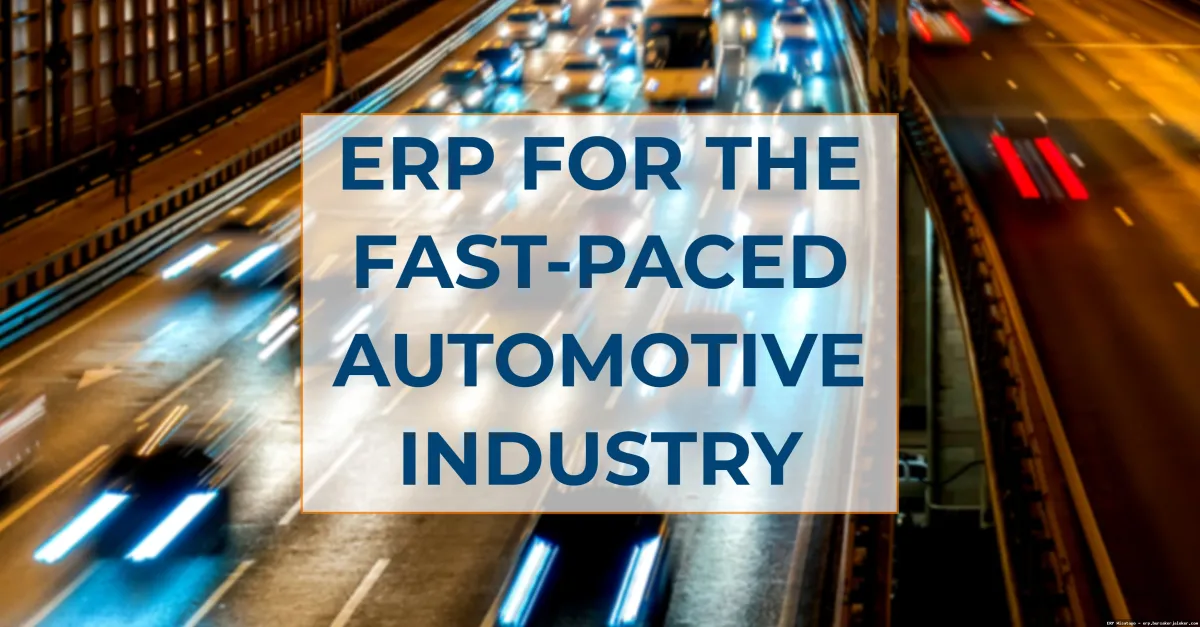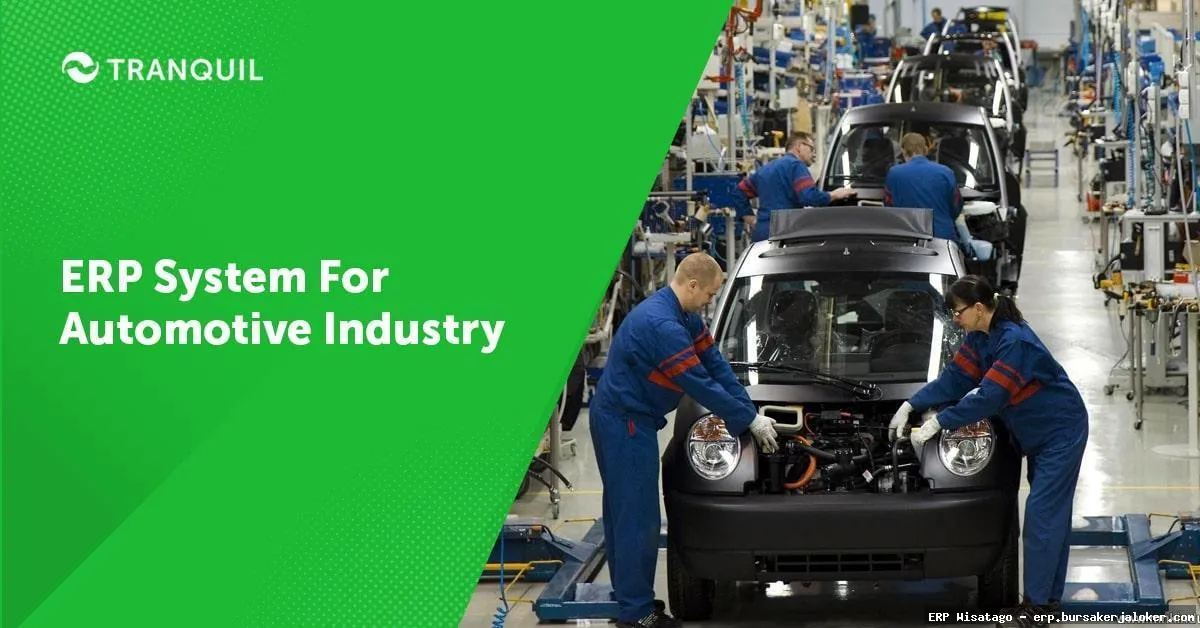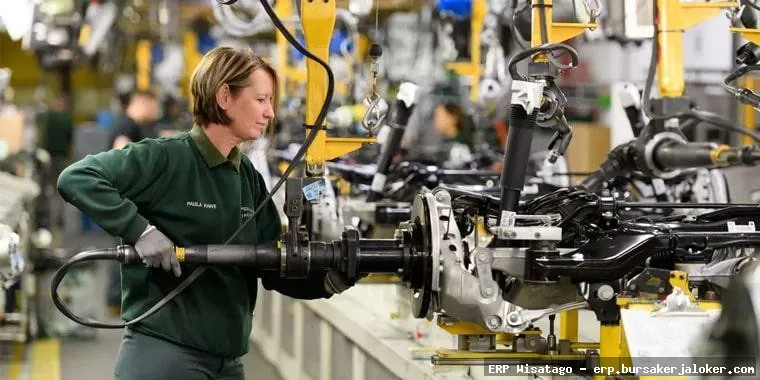The automotive industry is a complex beast. From design and engineering to manufacturing, supply chain management, and after-sales service, every step is intricate and interconnected. Juggling these moving parts efficiently and profitably requires more than just hard work; it demands a robust system that can seamlessly integrate all aspects of the business. That’s where Enterprise Resource Planning (ERP) comes in. Having been involved in several ERP implementations across various industries, including automotive suppliers, I’ve seen firsthand how a well-chosen and properly implemented ERP system can transform operations, reduce costs, and drive growth.
Think of ERP as the central nervous system of your automotive business. It’s the platform that connects all your departments – from finance and HR to production and sales – allowing them to share data and collaborate effectively. This unified approach eliminates data silos, streamlines processes, and provides real-time visibility into key performance indicators (KPIs). Without it, you’re likely relying on disparate systems, manual data entry, and countless spreadsheets, which are prone to errors, inefficiencies, and delays. The automotive industry, with its tight margins and demanding customers, simply can’t afford such inefficiencies.

This comprehensive guide will delve into the world of ERP for the automotive industry. We’ll explore the key features and benefits, discuss the challenges of implementation, and provide practical advice on how to select the right ERP solution for your specific needs. Whether you’re a small parts supplier or a large-scale manufacturer, this article will provide you with the knowledge you need to navigate the complex landscape of automotive ERP and make informed decisions that will drive your business forward.
What is ERP and Why is it Crucial for the Automotive Industry?
At its core, ERP is an integrated software system that manages and automates core business processes. It provides a centralized database and a unified platform for all departments to access and share information. This eliminates the need for separate, disconnected systems, which can lead to data silos, inconsistencies, and inefficiencies. For the automotive industry specifically, ERP addresses the unique challenges of this demanding sector.
The Specific Needs of the Automotive Industry
The automotive industry is characterized by several factors that make ERP a necessity:
- Complex Supply Chains: Automotive manufacturers rely on a vast network of suppliers, often spanning multiple countries. Managing this complex supply chain requires real-time visibility into inventory levels, production schedules, and supplier performance.
- Strict Quality Standards: The automotive industry is subject to stringent quality standards and regulations. ERP systems can help ensure compliance by tracking quality control processes, managing audits, and providing detailed traceability.
- Just-in-Time (JIT) Manufacturing: Many automotive manufacturers utilize JIT manufacturing to minimize inventory costs. ERP systems can help optimize production schedules and ensure that materials are delivered precisely when needed.
- Product Complexity: Vehicles consist of thousands of parts, each with its own specifications and requirements. ERP systems can help manage this complexity by providing detailed bills of materials (BOMs) and routing information.
- Demand Fluctuations: Automotive demand can be highly volatile, influenced by economic conditions, consumer preferences, and technological advancements. ERP systems can help forecast demand and adjust production schedules accordingly.
Benefits of ERP in the Automotive Sector
Implementing an ERP system can bring numerous benefits to automotive businesses:
- Improved Efficiency: Automating processes and streamlining workflows can significantly improve efficiency across all departments.
- Reduced Costs: By optimizing inventory levels, improving production scheduling, and reducing waste, ERP can help lower costs.
- Enhanced Visibility: Real-time access to data provides greater visibility into key performance indicators (KPIs), allowing for better decision-making.
- Better Customer Service: Improved order management, faster delivery times, and enhanced communication can lead to improved customer satisfaction.
- Enhanced Compliance: ERP systems can help ensure compliance with industry regulations and quality standards.
- Improved Collaboration: A centralized database and unified platform facilitate better collaboration between departments and with suppliers.
Key Features of Automotive ERP Systems
Not all ERP systems are created equal. An ERP system designed for the automotive industry should include specific features tailored to its unique needs. These features often go beyond the standard modules found in generic ERP solutions.
Demand Forecasting and Planning
Accurate demand forecasting is crucial for automotive manufacturers to optimize production schedules and avoid overstocking or stockouts. The ERP system should be able to analyze historical data, market trends, and other factors to generate accurate demand forecasts. This allows for better material planning and production scheduling.
Production Planning and Scheduling
The production planning and scheduling module should allow manufacturers to create detailed production schedules based on demand forecasts, capacity constraints, and material availability. It should also support various manufacturing strategies, such as make-to-stock, make-to-order, and assemble-to-order.
Supply Chain Management
This module is critical for managing the complex network of suppliers that automotive manufacturers rely on. It should provide real-time visibility into inventory levels, supplier performance, and shipment tracking. Key features include:
- Supplier Relationship Management (SRM): Manage supplier information, track performance, and collaborate on product development.
- Procurement Management: Automate the purchasing process, from requisition to payment.
- Inventory Management: Optimize inventory levels, track material movements, and manage warehouse operations.
Quality Management
Automotive manufacturers must adhere to strict quality standards and regulations. The quality management module should provide tools for tracking quality control processes, managing audits, and ensuring compliance with industry standards such as ISO/TS 16949 (now IATF 16949). This module should include features for:
- Inspection Management: Manage inspections at various stages of the production process.
- Non-Conformance Management: Track and resolve non-conformances.
- Corrective and Preventive Action (CAPA): Implement corrective and preventive actions to prevent future quality issues.
Engineering Change Management (ECM)
The automotive industry is constantly evolving, with new models and technologies being introduced regularly. The ECM module should allow manufacturers to manage engineering changes effectively, ensuring that all departments are aware of the changes and that they are implemented correctly. This is crucial for maintaining accuracy in BOMs and routings.
Warranty Management
This module helps manage warranty claims and track warranty costs. It should allow manufacturers to track warranty claims, analyze failure data, and identify areas for improvement in product design or manufacturing processes. For more information, you can refer to RMM as an additional resource.
EDI Integration
Electronic Data Interchange (EDI) is essential for exchanging data with suppliers and customers. The ERP system should support EDI integration to automate the exchange of purchase orders, invoices, and other business documents.
Challenges of Implementing ERP in the Automotive Industry
While the benefits of ERP are undeniable, implementing a system in the automotive industry is not without its challenges. Proper planning, communication, and change management are critical for a successful implementation.

Data Migration
Migrating data from legacy systems to the new ERP system can be a complex and time-consuming process. It’s crucial to ensure that the data is accurate, complete, and properly formatted for the new system. Data cleansing and validation are essential steps.
Change Management
Implementing an ERP system can significantly change the way employees work. It’s important to communicate the benefits of the new system and provide adequate training to ensure that employees are comfortable using it. Resistance to change is a common challenge, and proactive change management strategies are essential.
Integration with Existing Systems
Many automotive businesses have existing systems that need to be integrated with the new ERP system. This can be a complex process, especially if the existing systems are outdated or poorly documented. Careful planning and testing are required to ensure that the integration is seamless.
Cost Overruns
ERP implementations can be expensive, and cost overruns are common. It’s important to develop a realistic budget and carefully manage expenses throughout the implementation process. Scope creep should be carefully monitored and controlled.
Lack of Executive Support
Successful ERP implementations require strong executive support. Without it, the project may lack the resources and authority it needs to succeed. Executive leadership needs to champion the project and demonstrate its commitment to the new system.
Choosing the Right ERP System for Your Automotive Business
Selecting the right ERP system is a critical decision that can have a significant impact on your business. It’s important to carefully evaluate your needs and choose a system that meets your specific requirements. Consider these factors when making your decision:
Assess Your Business Needs
Before you start evaluating ERP systems, take the time to assess your business needs. What are your pain points? What processes do you want to improve? What are your long-term goals? Involve key stakeholders from all departments in this assessment process to ensure that all needs are considered.
Evaluate Different ERP Vendors
There are many ERP vendors that cater to the automotive industry. Research different vendors and evaluate their systems based on your specific needs. Consider factors such as functionality, cost, ease of use, and vendor reputation. Request demos and talk to other customers who have implemented the system.
Consider Cloud vs. On-Premise
ERP systems are available in both cloud and on-premise deployment options. Cloud-based ERP systems are typically more affordable and easier to implement, while on-premise systems offer greater control and customization. Consider your business needs and IT resources when making this decision.
Look for Industry-Specific Functionality
Choose an ERP system that is specifically designed for the automotive industry. These systems will have the industry-specific functionality you need to manage your complex supply chain, comply with quality standards, and optimize production schedules.
Check for Scalability
Ensure that the ERP system can scale to meet your future needs. As your business grows, you will need a system that can handle increased transaction volumes and support new business processes.
Get References
Talk to other businesses that have implemented the ERP system you are considering. Ask about their experience with the system, the implementation process, and the vendor’s support. This can provide valuable insights and help you make an informed decision.
Conclusion
ERP is no longer a luxury but a necessity for automotive businesses seeking to thrive in today’s competitive landscape. By integrating all aspects of the business, from supply chain management to production planning and quality control, ERP empowers companies to operate more efficiently, reduce costs, and improve customer satisfaction. However, successful implementation requires careful planning, strong executive support, and a commitment to change management.

Choosing the right ERP system is a critical decision. Thoroughly assess your business needs, evaluate different vendors, and consider factors such as industry-specific functionality, scalability, and cost. By taking the time to do your research and choose the right system, you can set your automotive business up for long-term success.
The journey to ERP adoption can be challenging, but the rewards are well worth the effort. With the right system in place, you can transform your automotive business into a lean, efficient, and profitable operation, ready to meet the demands of the ever-evolving automotive industry.
Frequently Asked Questions (FAQ) about ERP for automotive industry
What are the key benefits of implementing an ERP system specifically designed for automotive manufacturing?
Implementing an ERP system tailored for the automotive industry offers several significant advantages. Firstly, it provides enhanced supply chain management, optimizing inventory levels, reducing lead times, and improving supplier collaboration. This is crucial in the automotive sector due to its complex and global supply chains. Secondly, an ERP system improves production planning and scheduling, ensuring efficient resource allocation and minimizing production bottlenecks. This translates to increased output and reduced manufacturing costs. Thirdly, it facilitates better quality control by tracking defects, managing recalls, and ensuring compliance with industry regulations. Finally, a good ERP system provides real-time data and analytics, enabling better decision-making and improved overall business performance. These benefits help automotive manufacturers streamline operations, reduce costs, and improve competitiveness.
How can an ERP system help automotive suppliers manage complex part tracking and traceability requirements?
Automotive suppliers face stringent requirements for part tracking and traceability. An ERP system helps manage this complexity by providing a centralized platform for tracking parts from raw material procurement to final delivery. It allows for the implementation of unique identifiers, such as serial numbers or lot numbers, for each part. This enables real-time visibility into the location and status of every part throughout the supply chain. Furthermore, the ERP system facilitates compliance with industry standards, like IATF 16949, by providing detailed audit trails and documentation. It also streamlines the recall process by quickly identifying affected parts and customers. By automating these processes, an ERP system reduces the risk of errors, improves efficiency, and ensures compliance with regulatory requirements, all of which are critical for automotive suppliers.
What are the essential modules to consider when selecting an ERP system for an automotive component manufacturing business?
When selecting an ERP system for an automotive component manufacturing business, several modules are essential. Firstly, a robust Materials Management module is critical for managing inventory, procurement, and supplier relationships. Secondly, a Production Planning and Control module is vital for scheduling production, managing work orders, and optimizing resource utilization. Thirdly, a Quality Management module is necessary for tracking defects, managing inspections, and ensuring compliance with industry standards. A Sales and Distribution module is also important for managing customer orders, shipments, and invoicing. Finally, a strong Finance and Accounting module is crucial for managing financial transactions, generating reports, and ensuring regulatory compliance. Considering these modules ensures that the ERP system meets the specific needs of an automotive component manufacturing business.
